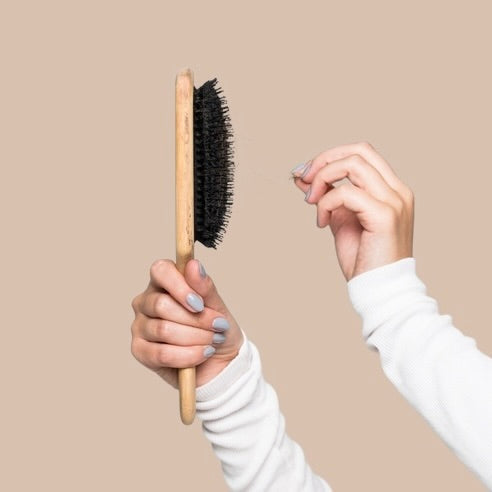
If you’ve ever looked in the mirror two or three years after having your baby and thought, “Why am I still losing hair? Shouldn’t this have stopped by now?” — I want you to know, you’re not alone.
I hear this concern so often. As a hairdresser, women often share a lot with me, and one recurring theme is hair loss and how it makes them feel. Sometimes there are tears, sometimes just a need to be heard — because hair loss is never just hair. It’s tied to confidence, identity, and how much of yourself you feel you recognise after becoming a mum.
I want you to know this: I hear you. And it’s okay to feel upset, worried, or even frustrated.
Why Is This Happening?
Most people are told that postpartum hair loss peaks around four to six months and settles by the time your baby turns one. And for many women, that’s true. But when you’re still seeing shedding years later, it can feel scary — and like something’s wrong with you.
The truth is, it isn’t always “postpartum hair loss” anymore. Other things can affect your hair even years after birth:
-
Hormonal shifts – Your body can take a long time to rebalance, especially if your cycle is still regulating or if you breastfed for longer.
-
Nutrition – Let’s be honest, looking after yourself with little ones isn’t easy. Skipped meals and quick snacks are part of mum life, and over time, your hair can reflect that.
-
Stress and fatigue – Motherhood is beautiful, but it’s also exhausting. Stress, lack of sleep, and emotional overwhelm can all trigger extra shedding.
-
Health changes – Sometimes issues like thyroid imbalance or low iron show up after pregnancy and can affect your hair too.
What I Want You to Know
Hair loss at this stage doesn’t mean it’s permanent. Your follicles are still alive. Your hair can recover. It might take time, and the journey isn’t always linear, but new growth is possible.
And while remedies and routines can help, I want to pause and say: sometimes what matters most is simply being heard. Your worries are valid. The distress you feel is real. You don’t have to brush it off or pretend it doesn’t matter—because it does.
Gentle Ways to Support Your Hair
While everyone’s journey is unique, there are gentle steps you can take to support your hair and scalp as they recover.
-
Nourish from within – The foundation of healthy hair always begins with a balanced diet, giving your body the vitamins and minerals it needs. But I know how challenging this can feel when you’re caring for little ones and putting yourself last. That’s why I created my Laura Simmons Biotin Gummies—to act as a bridge when life makes it hard to get everything you need from food alone, or when your body simply needs a little extra support. They provide key vitamins, including biotin, that are known to support normal hair health.
-
Look after your scalp – A healthy scalp is the starting point for healthy hair. My Sandalwood Shampoo and Conditioner are crafted with aloe vera, argan oil, lavender, and sandalwood to gently hydrate and strengthen. They keep your scalp balanced while giving your hair softness and shine.
-
Protect the new growth – Those shorter hairs that appear as your body recovers are fragile at first. My Lightweight Thermal Defence Serum helps shield them from heat, UV, and pollution, giving them the chance to grow stronger.
✨ A gentle reminder: regrowth takes time. Once you begin supporting your body and your hair, changes won’t happen overnight. It often takes 3–6 months before you begin to see new growth and feel the difference.
And I want to be clear: I believe in being realistic and telling the truth. There’s no magic product or quick fix. Nothing can make your hair grow overnight. What truly helps is understanding why the shedding is happening and learning how to support your body and your scalp through it. That’s where real, lasting recovery begins.
You’re Not Alone in This
If you’re reading this while worrying about your own hair loss, I want you to feel this deeply: you are not alone. I’ve listened to so many women who feel exactly how you do right now. It’s not silly, it’s not vain—it’s human.
Your body has been through so much, and your hair is simply part of that journey. With kindness, patience, and the right support, it will recover. And until it does, know that I hear you, I see you, and I’m here to walk this journey with you.
